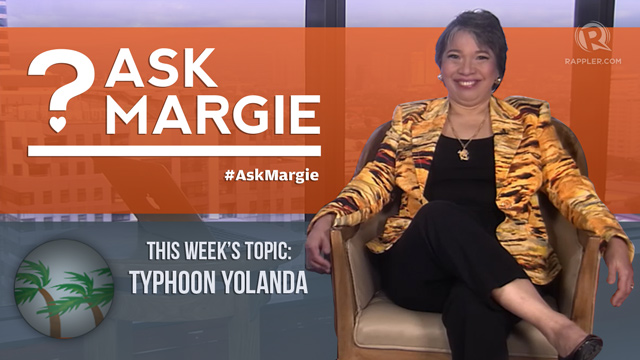SUMMARY
This is AI generated summarization, which may have errors. For context, always refer to the full article.

MANILA, Philippines – How do survivors cope after a disaster as tragic and damaging as typhoon Yolanda, international name Haiyan?
In this week’s episode of #AskMargie, clinical psychologist Dr. Margie Holmes will talk about psychosocial support, psychological first aid and stress debriefing.
These are timely topics, especially after the horrific devastation in the Visayas caused by Typhoon Yolanda.
Surviving a catastrophe of that magnitude is traumatic, and many believe talking about the experience helps, but does it really?
Ella Kintanar: I think the survivors just need someone to talk to, someone to hug, even. It’s important for them to know that they are not forgotten. There was one survivor in Villamor who said that on the first day after the storm, their dead looked like they were just asleep. On the second day, they began to bloat and the stench! The smell of death is something that they will never forget. Those are the images they will keep with them for the rest of their lives.
They also spoke about how scared they were at night — that strangers would steal whatever little they have left. So they trekked to the airport in Tacloban when they heard that there were mercy flights leaving for Manila, and that even if they don’t know anyone in Manila, they decided to go because that’s better than sleeping fitfully at night not knowing whether they will wake up with their throats slit.
DR. HOLMES: Good point, Ella, and I know you speak from experience as you were practically 24/7 since Yolanda hit us.
Orly Tugob: I heard stress debriefing in some countries are no longer encouraged because those who have undergone debriefing had a hard time recovering since the process makes someone recall the horrors of the tragedy instead of simply forgetting.
Orly cites one article, which warns against “one-time psychological debriefing”. The article goes on to say that the first priority in disaster situations is to provide physical and psychological safety.
Orly Tugob is also right. Thus, the need to distinguish between listening to people who want and need to share and asking people to recall events.
In fact, Orly, The Psych Assoc of the Phil (PAP) agrees with you. Its president has asked that Critical Incident Stress Debriefing (CISD) NOT be used for survivors because there is evidence that it impedes natural recovery.
Trelly Marigza asks: Who reminds personnel about the ethics of psychosocial intervention? Based on survivors’ stories, there have been instances where survivors/evacuees were treated as just cases and not as humans.
And again, Trelly has a point. Ethics are absolutely important because we have to be sure that we attain the goal we want: helping Yolanda survivors and not adding to their misery. And one way to do that is to ensure we have the competencies we claim to have.
Perhaps this might be a good time to differentiate between psychological first aid (PFA), stress debriefing (CISD) and post traumatic stress disorder(PTSD).
Psychological First Aid is an informed approach for assisting everyone, from infants to the elderly, in the aftermath of disaster and terrorism. It focuses on 1. contacting engaging with those affected, 2. Gathering Information on their Current Needs and Concerns AND 3. providing Safety, Comfort, Practical Assistance, and Linkage with Collaborative Services
This is what Yolanda survivors seem to need most and training volunteers to provide this can be done relatively quickly. Later, should some of the survivors need more help, therapy from psychiatrists and psychologists would be necessary, especially if post traumatic stress disorder (PTSD) is involved.
As Trelly shares:
Trelly Marigza: Trauma healing is a multi-field practice. Healing comes in various times depending on the individual or the community. It’s not immediate.
Edna Aquino: Is it possible that someone goes through a traumatic experience but may not feel the need for intervention and just go on with life?
DR HOLMES: Absolutely, Edna, though many might need some psychological first aid at the start, if only to point them in the right direction re: the agencies to they should approach for the financial, logistical and government help they need.
There’s PFA, CISD, even PTSD which we haven’t really discussed today. Is there anything coherent we can hold on to? Perhaps—and so, so sorry for another acronym, MHPSS (Mental Health and Psychosocial Support for Disasters) is the way to go. MHPSS recognizes that support should not stop at emergency responses. It emphasizes the importance of going beyond band-aid or stand alone psychosocial interventions to more integrated and long-term solutions.
To quote,
Stephanie Raquel: Psychosocial aid is something a lot of people neglect. The survivors, though smiling, are still traumatized. Aside from providing relief goods, building houses and restoring their livelihood, ensuring the stability of everyone’s mental health must be considered a vital aspect of the total rehabilitation plan.
Korek ka dyan, Stephanie!
– Rappler.com
Add a comment
How does this make you feel?
There are no comments yet. Add your comment to start the conversation.